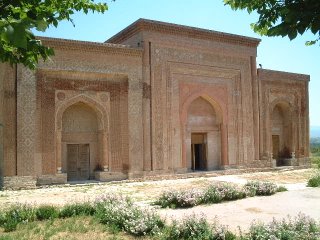
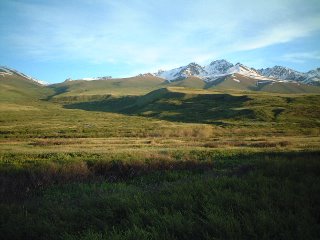
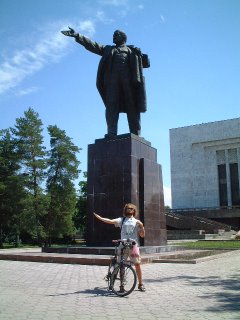

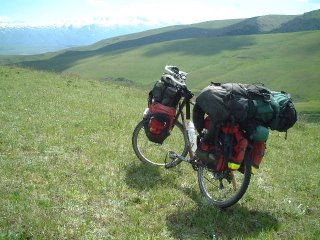
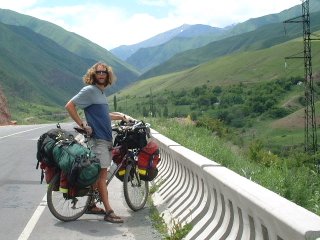
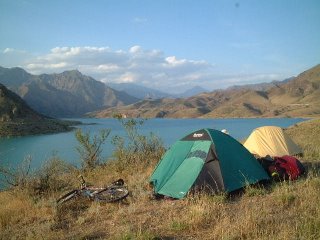
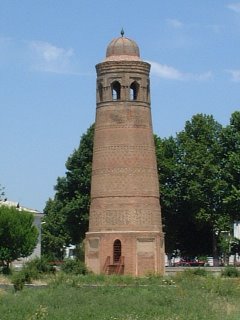
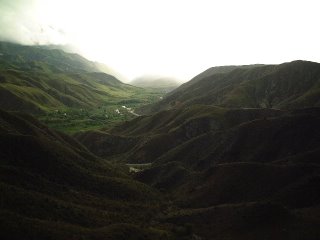
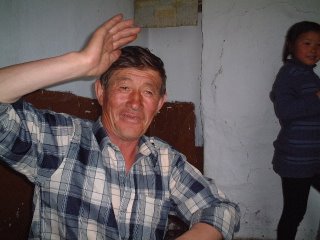
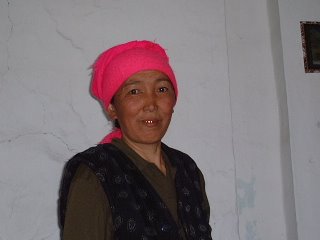
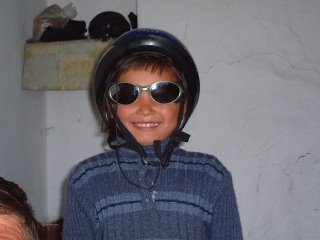
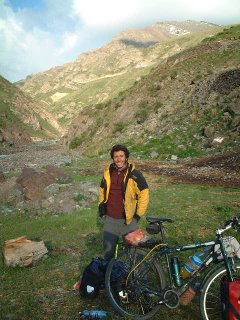
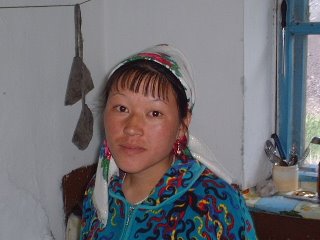
Osh, Kyrgyzstan, June 11
2297 km from Urumqi
5850 km from Xian
I am up past my bedtime on a night before riding, but it may be the last time I see e-mail for quite some time, so I'm going to write a brief summary of the past 9 days of riding from Bishkek to Osh. I'm full of borshch, beer, bread and kebabs, the four major food groups of Central Asian travellers, so I'll be full of energy for typing this evening.
After 5 days of delicious indolent sloth in Bishkek, waiting for visas and permits, Antoine (aka Pushkin for his long sideburns and Pushkinesque face) and I rolled out of the capital last Wednesday afternoon. It was tough to tear ourselves away from the European ambience and sensational beauties of Bishkek, but the road was calling us. We rode 50 flat kilometres out of town and camped in some farm fields, lulled to sleep by croaking frogs.
The next day saw us start up the first really serious climb of the trip, from an altitude of 700 metres to a pass at 3700 metres. We climbed all day up a desolate rocky gorge, and gave up the struggle 80 km from where we had started but still well below the top. It was a long, hard day, but it felt good to have put most of the climb behind us.
We awoke refreshed after a night camped beside a rushing trout-filled stream and continued the struggle, peering far up the mountainside to pick out our upcoming route. Coming around a hairpin bend near the top, we met four American Peace Corps volunteers whose chartered taxi had broken down, and had a long conversation with them before pushing onwards and upwards, through luxurious grassy meadows, to the mouth of the tunnel which has recently replaced the road over the pass. We donned headlamps and reflectors and set off into the maw of darkness. When we emerged on the other side, the world had changed. Gone were the steep rocky defiles of the north side of the range, in favour of open, gentle grassy slopes rolling down to a flat, broad, high-altitude valley. We flew down in spasms of gravitional giddiness (up to 65 km/h) and had a memorable lunch break on a green hillside carpeted with wildflowers, watching the tiny sheep far below and the snow-capped peaks beyond. When we finally hit the bottom, we zipped up the valley to an exquisite campsite beside a rushing stream; only the clouds of voracious mosquitoes spoiled the bucolic perfection of the spot.
Another pass awaited us the next morning, but this was a gentler proposition than the first one, and we crossed the broad, boggy top, only a few days removed from winter snows, in early afternoon. The descent was one of the best of my cycling life, an endless series of mountain vistas reminiscent of the Italian Alps, each bend of the valley revealing a yet more perfect scene. The river boiled beside us in an unbroken series of whitewater rapids, and roadside stands sold honey and trout. It was sad to leave the gorge after 60 unforgettable kilometres and emerge into the drab town of Toktogul. We took a page from Antoine's playbook and asked a farmer for permission to camp in his yard; they were very hospitable and fed us a lavish breakfast the next morning, but they woke up loudly at 6 am and made it difficult to complete our beauty sleep.
We spent the entire next day circling Lake Toktogul, a hydro reservoir, drenched by a never-ending series of rainshowers, each more violent than the last, and tired by an equally infinite series of sharp uphills and downhills. The final instalment of precipitation was a frightening hailstorm which pummelled us on the final mini-pass of the day and sent us scurrying for shelter at another farmhouse where the hospitality was just as warm but the people got up even earlier. Bleary-eyed, I made Antoine promise that we would henceforth camp somewhere secluded by ourselves.
We had another lovely downhill in the morning, punctuated by a much-needed swim and me breaking my drum brake cable--twice. I finally figured out what was wrong, and did some metalwork to repair a bend retaining arm. We lunched sumptuously on river trout, and emerged ready for a big afternoon, only to be foiled by a road closed for repairs. We sneaked through after an hour, almost losing Antoine along the way to a huge boulder rolling down from above, and had another frustrating roller coaster afternoon around not one but four separate hydro reservoirs. The day was redeemed, however, by the best campsite of the trip, on a rocky headland projecting into the last reservoir. The surroundings looked Aegean, and we swam in the last light of afternoon before cooking and then watching a spectacular lightning storm over the mountains we had just left. We took time-lapse photos, and I sat outside watching the light show and playing guitar in one of the most relaxed, yet invigorating, evenings of the trip.
From that point on we dropped out of the high mountains into the relative lowlands of the Ferghana Valley. Warm, fertile and settled by agricultural societies for the past 3000 years, the Ferghana is a world apart from the rest of Kyrgyzstan. For one thing, the people mostly speak Uzbek, and many of them are ethnically Persian, with sharp Indo-European features instead of the broad, smooth Mongolian faces of the Kyrgyz. I felt as though I had left behind Europe and returned to the Asia I know, the rice fields of South-East Asia and the farming villages of central India. Even the birds were old friends, the Indian rollers and bee-eaters that had kept me company on previous trips in South and South-East Asia. The scenery became unremarkable, dun-coloured hills surrounding flat, fat farmland, with the mountains receding far into the distance.
The borders of Central Asia are all artificial, products of Stalin's ethnic divide-and-conquer strategy, but nowhere are they as farcical as in the Ferghana Valley. Uzbekistan controls most of the lowlands, with the Uzbek-Kyrgyz border extending narrow fingers of Uzbek valley into the Kyrgyz hills. It gets even sillier to the south, where three tiny enclaves, two Uzbek and one Tajik, are surrounded on all sides by Kyrgyz territory. The convoluted fractal boundaries make travel a pain, as roads take long unmarked detours to avoid crossing into Uzbek valleys. We zigged and zagged and cursed the horrible road surface, but made good progress towards Jalalabad until the moment when we stopped to phone the Iranian embassy in Bishkek about Antoine's visa. While he struggled with the intricacies of Kyrgyz Telekom, I faced a curious mob of 100 or so people, answering questions about my name, my marital status, why I don't have children and who is sponsoring the bike trip (nobody believes that I could possibly want to do this just out of interest). When it came time to depart, Antoine's derailleur suddenly exploded into a mass of twisted metal and ruined chain. It took two hours of work to fix the mess, aided by a nearby auto body shop, during which time I was the star and backdrop of several rolls of film: Graydon with his bike, little Kyrgyz kids on Graydon's bike, Graydon on horseback in a Kyrgyz felt hat, Graydon surrounded by entire families....We were glad to escape from Massi and camp in a stand of poplar trees.
I was awoken the next morning by the insistent mooing of cows and the frantic screams of their 7-year-old herders. Antoine must have awoken to the same sounds, since I soon heard a howl of "Ta gueule!!" (ie, shut up!) from his tent. We had a relaxed ride into Jalalabad that morning, although Antoine found the final climb taxing and decided that he needed some time off the bike. He headed off to Bishkek that afternoon by shared taxi to pick up his Iranian visa, and I haven't seen him since, as he was delayed by mechanical and bureaucratic gremlins; I hope he shows up tomorrow morning!!
I spent a much-needed day off in complete lethargy in Jalalabad, stopping eating only to bike up to the hilltop sanatorium overlooking town. I had visions of Japanese rotenburo open-air hot pools lined with artfully arranged rocks. What I found instead was a decaying Soviet-era disaster. You would think that in an institution which owes its very existence to hot springs, it would take less than 40 minutes to find hot water. In the end I was escorted into the bowels of a huge condemned building to a once-white enamel tub where I took a bath, surrounded by the rusting, dripping, moulding remnants of plumbing. I should have remembered that there are two words which can reduce even the hardiest traveller to gibbering incoherent fear: Communist plumbing.
On a more positive note, I spent much of my time in Jalalabad socializing with the local Peace Corps volunteers, a diverse, interesting group full of information and gossip on the state of Kyrgyzstan. They filled me in on the local custom of bride-napping (many, many marriages in Kyrgyzstan are still arranged this way), the extraordinary wealth of the governor of Naryn province (the poorest part of Kyrgyzstan) and relations between the genders in the country.
Today I finally managed to leave early, and had a relaxed, if hot, roll around another corner of Uzbekistan (it added 60 km to the distance), via the town of Ozgon and its 11th-century mosque and mausolea, ancestors of the Moghul style of the Taj Mahal. I spent a happy hour sketching and photographing before sweating my way along the worst roads of the trip, 55 km of bombed-out, corrugated asphalt punctuated by brief stretches of washed-out gravel, into Osh.
I will await Antoine here tomorrow morning before beginning a voyage into the almost-unknown: the Pamir Highway through Tajikistan. Everyone here who hears that I'm off to Tajikistan tells me that I'm as good as dead, if not from rebels then from heroin smugglers coming from Afghanistan. I can't wait to see the huge peaks of the Pamirs, though, and I'm sure that the warnings about Tajikistan will prove as ill-founded as the dire predictions of robbery and death I received about Kazakhstan.
I'll keep you all posted on how the Bam-i-Dunya, the Roof of the World, goes the next time I see e-mail, likely in Dushanbe in 2 or 3 weeks. Until then, be good, have fun and carpe diem!
Cheers
Graydon
